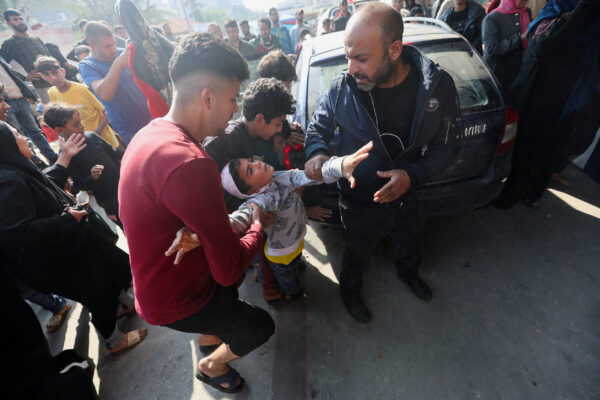By Arafat Barbakh and Mohammed Salem
KHAN YOUNIS, Gaza, Dec 1 (Reuters) – At Nasser Hospital in southern Gaza, a man cradling a boy with a bloodied scalp cried for help.
Another boy with a gash on his cheek and tears in his eyes lay under a blanket. A third, his face covered in blood, waited for treatment.
Within hours of the lapse of a week-old truce between Israel and the Palestinian group Hamas which runs Gaza, the enclave’s health ministry reported that 54 people had already been killed in Israeli air strikes.
Reuters footage from Nasser Hospital, the second largest in the Gaza strip, showed a steady stream of wounded being brought in as other people wept outside beside bodies of loved ones killed in strikes.
Aid groups and the United Nations say a small fraction of health facilities in the devastated enclave are still functioning and those are in no shape to handle a new wave of casualties.
“Hospitals across Gaza lack the basic supplies, staff and fuel to deliver primary health care at the scale needed, let alone safely treat urgent cases,” U.N. Secretary-General António Guterres said on Thursday.
Gaza had 2.3 million residents before Israel began a bombardment and ground invasion in response to the Oct. 7 rampage by Hamas, when Israel says gunmen killed 1,200 people and took 240 hostages.
Palestinian health authorities that the U.N. deems credible say more than 15,000 Gazans have been confirmed killed and thousands more are missing and feared buried under rubble. The U.N. says as many as 80% of the population may have been driven from their homes.
“Gaza’s health system has been crippled by the ongoing hostilities,” Dr Richard Peeperkorn, the World Health Organisation’s representative in Gaza, said.
“It cannot afford to lose any more hospitals or hospital beds,” he told reporters by video link. “We are extremely concerned about the resumption of violence.”
Rob Holden, a WHO senior emergency officer, told the same briefing that he had visited Al Ahli Hospital in Gaza City on Friday morning.
“The only way to describe it is like a horror movie when you walk in there,” he said, adding that there were “patients on the floor with the most traumatic injuries that you can imagine”.
Humanitarian officials say fuel is critically needed to keep hospitals functioning and the U.N. on Friday described the hostilities as “catastrophic”.
After Israel resumed its military campaign on Friday, the entry of aid and fuel trucks for Gaza at Egypt’s Rafah crossing halted. The quantity of aid delivered had increased during the truce, though aid officials said it was still far less than what was needed.
REUTERS


Leave a Reply
You must be logged in to post a comment.